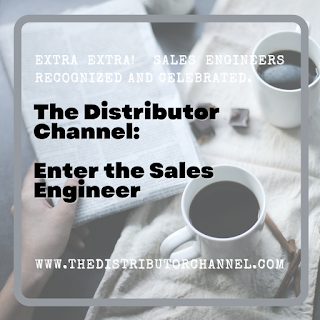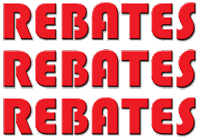Enter the Sales Engineer
 True confessions, way back in the early stages of my
career, a friend who knew I was in sales gave me a Zig Ziglar calendar. Each day came with random quotes from the
famed sales trainer. Quite frankly, most
of them were throwaways that applied more to guys selling waterbeds or satellite
TV contracts than to the electrical and automation products I was selling. Sandwiched into those 365 days (maybe 366, it
could have been leap year for all I know) were two quotes that I continue to share
with others:
True confessions, way back in the early stages of my
career, a friend who knew I was in sales gave me a Zig Ziglar calendar. Each day came with random quotes from the
famed sales trainer. Quite frankly, most
of them were throwaways that applied more to guys selling waterbeds or satellite
TV contracts than to the electrical and automation products I was selling. Sandwiched into those 365 days (maybe 366, it
could have been leap year for all I know) were two quotes that I continue to share
with others:
Thought One:
“Enthusiasm for the product or service
comes from product knowledge. How can we develop enthusiasm for something about
which we have little or no knowledge?”
Thought Two:
“Stop selling. Start helping.”
These should be the mottos of every salesperson on the planet regardless of industry. If you consider yourself a Sales Engineer, they are mandatory descriptors.
For the past 40 plus years, I have considered myself to
be a Sales Engineer. Why this
designation? To start, my very first
business cards displayed the title of “Sales Engineer” prominently below my
name. More officially, I carry a degree
in Computer Engineering. Thinking back,
and paraphrasing my son with the same degree, back when I studied Computer Engineering
the devices had a fill spout to add kerosene.
While I earned an Engineering degree, I do not believe a degree
is necessary to be a successful Sales Engineer.
In fact, one of the best and brightest people I ever met had a deep
product understanding courtesy of the U.S. Air Force and never quit learning about
new products or their applications. He
lived his personal and professional life demonstrating his desire to help both
his customers and the youngster down the street. Like all truly successful people in the role,
he thought solved problems and scientifically analyzed things. Even more importantly, Jack helped many
newbie salespeople adopt this selling model.
My business centers around and embraces a business model
I call knowledge-based distribution. My
client base consists of distributors wrapping the products they sell in their
deep understanding of the products and their applications. While other distributors may be better at
shipping brown boxes from one place to another, knowledge-based distributors sell
products along with advice, consultation, and often customer training/education. These distributors’ customers and suppliers
are willing to pay a premium for the product based on the extra values
provided.
Most knowledge-based distributors sell products that are technical
in one way or another. These products
and services require a person with engineer-like knowledge to deeply
understand. The most successful salespeople
are those who, regardless of degree or background, can understand the
product/technology, comprehend the application of said products, and have a
strong desire to help their customers.
While some salespeople do not adopt these traits, most
move on to organizations where price and relationship suffice for technical
prowess. Those who stay grow loyal
followings of customers who value the knowledge and services provided in their organization’s
and their own personal package of values.
Sadly, over the years, most truly successful Sales Engineers
honed the selling portion of their skills in the school of hard knocks. The tuition was expensive, and many dropped
out along the way. Those who succeeded
were fortunate to find a mentor and embraced the philosophy. There was no association for the advancement
of the profession, no formalized group for the sharing of ideas, and very few
opportunities to benchmark performance.
Other occupations have programs to grow the
professionality of those working in similar roles or positions. One obvious example comes by way of a group
we all encounter with customers – the professional purchasing guy. A quick Google search reveals more than a
half dozen such organizations. Drilling
into their training structure, most seem to have relegated themselves to
finding ways to harvest the value of a Sales Engineer without regard for paying
for that value.
Those of us who practice the craft of Sales Engineering finallyhave a group devoted entirely to the work we perform. The North American Association of Sales Engineers (NAASE) is a group boasting Sales Engineers, Technical Sales Reps and Solution Consultants from a variety of industries with the following mission:
We aim to foster a base of
certified Sales Engineers across North America, enable them to connect with one
another, and actively promote the profession.
They go on to say:
“We
at NAASE believe that the Sales Engineer plays a crucial role in the
workforce. However, without a large body and certification behind it, the Sales
Engineer can often find themselves lacking an organization to belong to.
The North American Association of Sales Engineers aims to fill that
gap with its Certified Sales Engineer designation, through enabling members to
connect, providing an open forum for members to discuss hot topics in the
field, and by advocating on behalf of the profession.”
As you can probably guess, upon learning about the group, I immediately fell in love with the concept. Further, they have posted a few of my articles onto their blog and I plan to contribute more items in the future. It is my understanding I may even qualify for membership. Check it out for yourself. I’m sure you’ll want to add this group to your credentials.
NAASE website: https://sales-engineering.org
NAASE blog: https://sales-engineering.org
Frank Hurtte is the Founding Partner of River Heights Consulting. Once dubbed “the Mark Twain of the Distribution World,” Frank combines the battle scars of 28 years of front-line "in the trenches" experience with over 16 years of service to knowledge-based distributors and their manufacturer partners.
His easy-going demeanor and “Iowa-speak” make him a relatable favorite among speakers.
Email or call today to see how River Heights Consulting can take your distributor business to the next level.






Comments